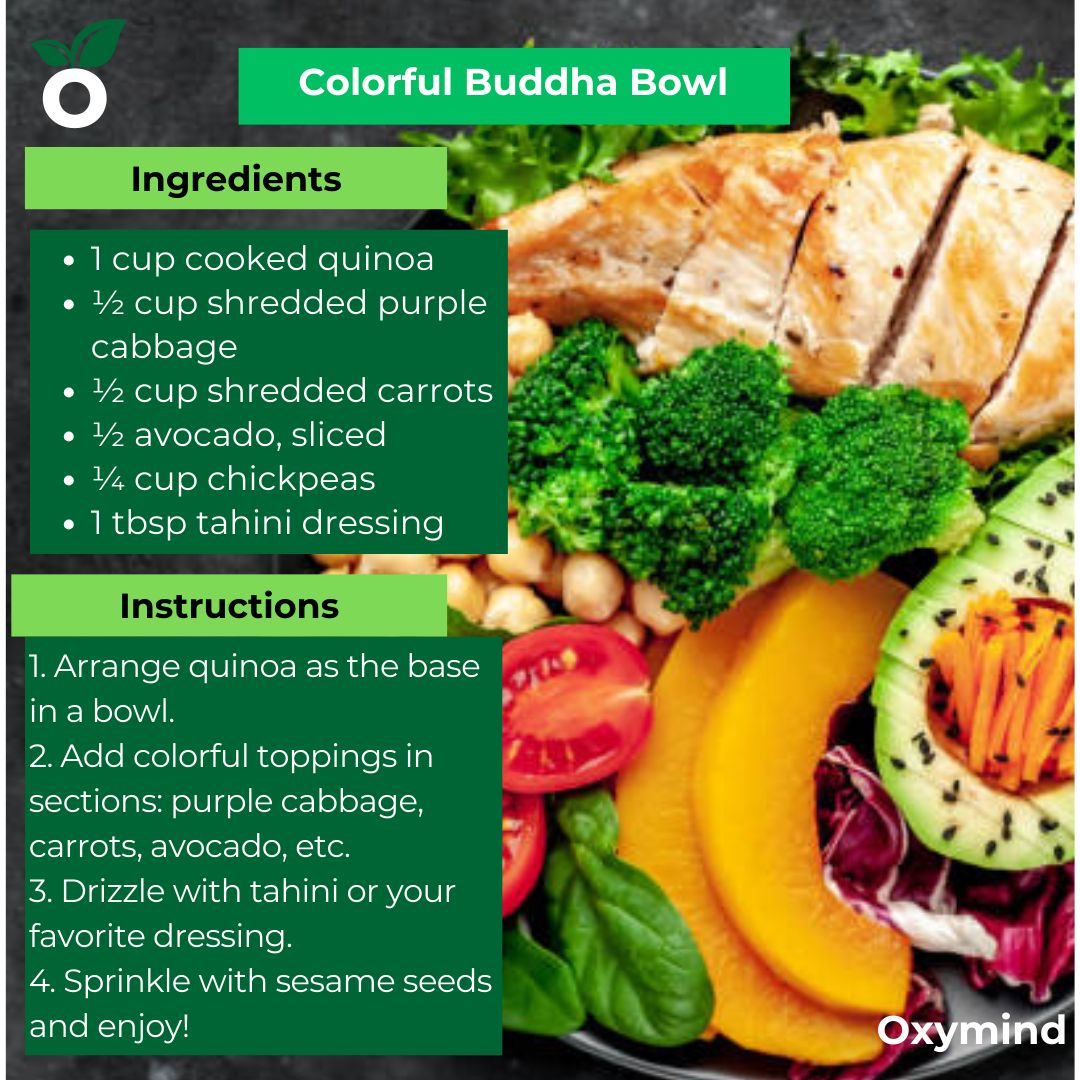- The Oxymind
- Posts
- Nutrition & Mood: How Your Diet Shapes Your Mind
Nutrition & Mood: How Your Diet Shapes Your Mind
Fueling Mental Health Through Evidence-Based Eating.
Dear Oxymind Readers
In Today’s Edition
Nutrition & Mood: How Your Diet Shapes Your Mind
Recipe of the week: Colorful Buddha Bowl
Mindful Financial Check-in
Resource of the Week
🧠 Productivity Hack of the Week: Task Snacking
Nutrition & Mood: How Your Diet Shapes Your Mind

Today, we're examining another critical pillar of mental health that's often overlooked: the food on your plate. The connection between what you eat and how you feel isn't just about physical energy—it's about providing your brain with the raw materials it needs to regulate your emotions, handle stress, and maintain cognitive clarity.
THE SCIENCE: YOUR BRAIN ON FOOD
Your brain accounts for just 2% of your body weight but consumes a staggering 20-25% of your daily energy intake. This energy-hungry organ is particularly sensitive to what you feed it—and the effects go far beyond simple fuel.
Research increasingly shows that our gut functions as a "second brain," producing many of the same neurotransmitters that regulate our mood. This gut-brain axis means the foods you eat directly influence your emotional state, often within hours of consumption.
The Hard Numbers: Diet & Mental Health
People who follow a Mediterranean diet show 33% lower risk of depression
Highly processed food diets are associated with a 58% increased risk of anxiety and depression
90% of serotonin (the "happiness" neurotransmitter) is produced in the gut
Inflammatory diets increase depression risk by up to 40%
Omega-3 deficiency is present in nearly 70% of people with clinical depression
Blood sugar swings can trigger anxiety symptoms that mimic panic attacks in susceptible individuals
Case Study: Michael, a 42-year-old with treatment-resistant depression, saw minimal improvement with traditional therapies alone. After working with a nutritional psychiatrist who identified several nutrient deficiencies and inflammatory triggers, his depression scores improved by 60% within three months of dietary intervention.

Good food-Good mood
THE MOOD-FOOD CONNECTION: KEY NUTRIENTS
Omega-3 Fatty Acids
Brain Benefits: Reduce inflammation, support cell membrane fluidity, and promote neuroplasticity
Found In: Fatty fish (salmon, mackerel), walnuts, flaxseeds, chia seeds
Mental Health Impact: Research shows supplementation may be as effective as some antidepressants for mild to moderate depression
B Vitamins
Brain Benefits: Essential for energy production and neurotransmitter synthesis
Found In: Whole grains, legumes, eggs, leafy greens
Mental Health Impact: Deficiencies strongly linked to increased depression, anxiety, and cognitive decline
Probiotics & Prebiotic Fiber
Brain Benefits: Support gut microbiome diversity and gut-brain communication
Found In: Yogurt, kefir, fermented foods, garlic, onions, bananas, oats
Mental Health Impact: Emerging research shows certain probiotic strains may reduce anxiety and depression symptoms
Antioxidants
Brain Benefits: Combat oxidative stress that damages brain cells
Found In: Colorful fruits and vegetables, especially berries, dark chocolate
Mental Health Impact: Higher antioxidant intake correlates with lower depression rates and better cognitive performance
Magnesium
Brain Benefits: Regulates neurotransmitter release and stress response
Found In: Dark leafy greens, nuts, seeds, legumes, whole grains
Mental Health Impact: Deficiency linked to increased anxiety, insomnia, and stress sensitivity
My Experiment: I tracked my mood after meals for two weeks and discovered that my energy crashed and irritability spiked about 90 minutes after carb-heavy lunches. Switching to protein-centered meals with healthy fats stabilized my afternoon mood significantly.
MOOD DISRUPTORS: WHAT TO MINIMIZE
While focusing on nutritious additions is important, equally significant is identifying what might be sabotaging your mental wellbeing:
Refined Sugar
The typical blood sugar spike and crash not only affects energy but triggers stress hormone release that can mimic or exacerbate anxiety.
Alcohol
Despite its temporary relaxing effects, alcohol depletes serotonin, disrupts sleep architecture, and increases anxiety sensitivity the following day.
Highly Processed Foods
Ultra-processed foods high in artificial ingredients, preservatives, and refined carbohydrates increase inflammation markers associated with depression.
Excessive Caffeine
More than 400mg daily (about 4 cups of coffee) can trigger anxiety symptoms, disrupt sleep, and intensify stress responses.
Nutrition Expert Says: "Most people seek immediate relief when feeling low—often through sugar, alcohol, or caffeine. While these provide temporary mood lifts, they ultimately deepen the neurochemical imbalances that drive anxiety and depression. Breaking this cycle requires focusing on long-term brain nutrition rather than quick fixes."
SPOTLIGHT: THE MEDITERRANEAN DIET & MENTAL HEALTH
The Mediterranean diet has emerged as the gold standard for brain health, with multiple studies showing significant benefits for mood regulation and cognitive function.
Key Components:
Abundant plant foods (fruits, vegetables, legumes, nuts)
Olive oil as the primary fat source
Moderate consumption of fish and seafood
Limited dairy, poultry, and eggs
Minimal red meat
Moderate wine consumption with meals (optional)
A landmark SMILES trial found that participants with depression who adopted a Mediterranean diet experienced remission rates nearly three times higher than the control group receiving standard care.
What makes this approach so effective is its emphasis on anti-inflammatory foods rich in polyphenols, healthy fats, and complex carbohydrates that support the gut-brain axis while avoiding mood-disrupting processed foods.
Recipe of the week: Colorful Buddha Bowl

Colorful Buddha Bowl
Mindful Financial Check-in
Mindful Financial Check-in: Spend 5 minutes every Monday reviewing weekend expenses. This simple habit has helped users reduce impulse spending by 31%.
The Process: Set a recurring 5-minute appointment every Monday morning to review weekend transactions. Use a three-color system (green/yellow/red) to categorize each purchase based on alignment with your financial goals. Look for patterns rather than judging individual purchases.
The Psychology: This practice works by creating what behavioral economists call a "mindfulness buffer" between impulse and action. By reviewing recent spending without judgment, you train your brain to automatically pause before future purchases. Financial therapist Dr. James Hong notes: "It's not about restriction—it's about conscious choice."
The Results: Users who maintain this 5-minute practice for one month report: 31% reduction in impulse purchases, 22% increase in satisfaction with the purchases they do make, and significantly lower financial anxiety scores. The key factor is consistency rather than the length of the review.
Resource of the Week
Genius Wave: A neuroscience-based device that uses sound waves to promote relaxation and mental clarity, aiding healing.
Mindfulness: Everyday guided practice and meditation to help you deal with anxiety and overwhelm
Online Therapy Platforms: Services like Everyday Yoga and Talkspace offer accessible counseling options for those seeking professional support.
Productivity Hack of the Week: Task Snacking
When the mind feels weighed down by a big task, it's often not the work itself—but the story we tell ourselves about how hard it will be.
Task Snacking is a simple practice: break larger tasks into small, manageable actions that take just a few minutes. Instead of “write the report,” you start with “jot down three key ideas.” Instead of “clean the apartment,” begin with “fold the laundry.”
These tiny actions bypass overwhelm and invite gentle momentum—one small step at a time.
A helpful reminder: progress doesn’t need to be loud to be meaningful.
THE BOTTOM LINE
The foods you eat don't just fuel your body—they build your brain, influence your neurochemistry, and ultimately shape your emotional experience. While nutrition alone isn't a silver bullet for mental health challenges, optimizing your diet can dramatically enhance your emotional resilience and provide a foundation for other therapeutic approaches to work more effectively.
Remember that sustainable dietary changes happen gradually. Rather than overhauling your entire diet at once, focus on adding more brain-supporting foods week by week. Your mind—and mood—will thank you.
Here's to nourishing both body and mind,
Bolaji
The OxyMind.

